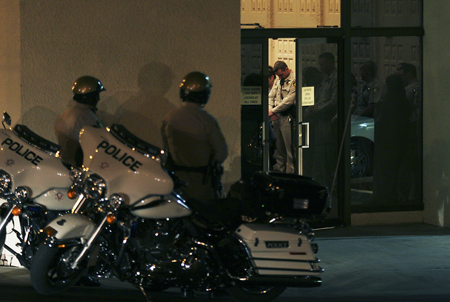Thousands expected for officer’s funeral; road closures planned
For police officers, paying respects to a fallen peer isn’t just part of the job — it’s entwined in the very fabric of their culture.
Thousands of local and out-of-state police officers are expected to attend the funeral of officer Milburn “Millie” Beitel on Wednesday morning at St. Elizabeth Ann Seton Catholic Church, a gesture Clark County Sheriff Doug Gillespie said shows how tightly knit the law enforcement community is.
“Camaraderie is an aspect of our profession. Whether you’re a police officer in Dallas, Oakland, Pittsburgh or Las Vegas, when one of us falls in the line of duty, in the honor of ultimate sacrifice, police departments send units to funerals,” Gillespie said.
“People don’t do it because it’s the customary thing to do. I believe it’s heartfelt.”
A funeral Mass for Beitel, 30, will take place at 11 a.m. at the church, at 1811 Pueblo Vista Drive, near Buffalo Drive and Lake Mead Boulevard. A burial procession will follow to Palm Mortuary and Cemetery, 7600 S. Eastern Ave., south of Warm Springs Road.
Police are advising the public to expect delays between 9 a.m. and 11 a.m. as the procession departs Palm Mortuary, at 1325 Main St., for the church, and again between 1 p.m. and 2 p.m., as the procession leaves the church for the cemetery.
Pueblo Vista Drive will be closed to northbound and southbound traffic from Vegas Drive to Lake Mead from approximately 9 a.m. to 1 p.m. Eastern Avenue will be closed to northbound and southbound traffic from Robindale Road to Warm Springs from about 1:30 p.m. to 2:30 p.m.
Police spokesman Bill Cassell said arrangements are being made so that as many department personnel as possible can attend the funeral without compromising public safety.
“There will be adequate law enforcement available to protect our citizens,” he said.
Beitel was killed in a single-vehicle crash last week when his patrol car struck a “fixed object” just north of the intersection of Nellis Boulevard and Washington Avenue. The vehicle rolled and came to a stop on its roof.
The car did not strike another automobile. Skid marks at the scene appeared to show the driver had attempted to steer away from something.
A second officer in the car, David Nesheiwat, 25, a three-year veteran of the department, remains in serious but stable condition at University Medical Center, police said Tuesday afternoon.
Details of the crash have not yet been released by police. It’s not known at what speed the patrol car was traveling, whether the officers were wearing seat belts, whether their emergency lights and siren were on, what happened in the moments leading up to the crash and who was at the wheel.
Gillespie said more information will be released after the investigation, perhaps later this week.
Beitel’s family has asked Gillespie to speak at the funeral, which he said is an honor and a privilege.
He has spent a considerable amount of time thinking about what he’ll say, he said, adding that it’s sobering to remember he was in the same position just months ago.
In May, officer James Manor was killed after his patrol car — traveling 109 mph on Flamingo Road without emergency lights or sirens — struck a pickup truck and rolled. Manor was responding to a reported assault on a 14-year-old girl.
“Speaking at a funeral, I don’t think anybody looks forward to those types of experiences,” Gillespie said. “I’ll do my best to speak on behalf of officer Beitel, to honor him.”
The police practice of having large turnouts for funerals, in which many officers sometimes travel from great distances, is not new, said Bill Sousa, a University of Nevada, Las Vegas criminal justice professor.
“Police culture is very strong, because of the nature of police work and the inherent risks associated with being an officer,” Sousa said. “They share values and rely on their culture for their professional well-being and often their social well-being.”
He said that when an officer is killed in the line of duty, it strikes close to home because officers share many risks. Even if they don’t know the officer personally, they understand that under different circumstances, it could be them, he said.
Sousa said that among professions with high degrees of risk, there are often similar turnouts at funerals, including those for firefighters and military personnel.
“They recognize that within the culture, if something bad happens to one, they all feel that.”
Contact reporter Mike Blasky at mblasky@reviewjournal.com or 702-383-0283.



















